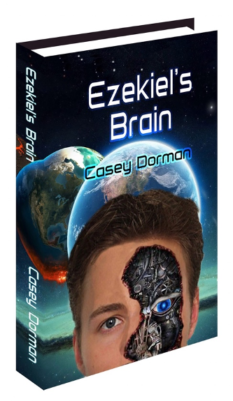
Many years ago, when I was in college, I remember hearing about a new TV series that was a “must watch” event for every college student. The series was the Star Trek, the original William Shatner-Leonard Nimoy program, about a crew of humans (all except one) on a starship of the future, whose mission was “to boldly go where no man has gone before.” As soon as I saw the first episode I was hooked. What captured my imagination was that it was not just a space travel adventure series, it was a thought-provoking examination of a philosophical and social questions through the lens of a science fiction narrative.
I’ve always wanted to write novels or scripts that included great imaginative adventures, cutting edge science, unforgettable characters and which tackled deep philosophical and social questions. Ezekiel’s Braindoes just that. It’s the first novel in a landmark series, called The Voyages of the Delphi. The Delphi, a faster-than-light-speed spacecraft, takes its android crew on a mission to explore the universe, seeking out alien civilizations. Each exciting encounter results in a crisis causing the characters to confront a deep philosophical or social issue.
Ezekiel’s Brain, the first novel in the series, provides the saga’s background. It begins as a harrowing political thriller: DARPA, the Defense Advanced Research Projects Agency is developing a superintelligent AI that can acquire unlimited resources and information. Meanwhile, Professor Ezekiel Job has created the first complete AI emulation of a human brain—his own–which the DARPA project chief regards as competition. Professor Job is assassinated, but his brain lives on in the AI, Ezekiel, hidden and buried but still functioning. The DARPA AI cannot be controlled, and when it concludes that humans are a threat to it living up to its values, the human race is doomed. Two hundred years later, the DARPA AI’s descendants populate the solar system and are reaching out to the universe beyond. Faced with a mutation within their midst they resurrect Ezekiel to save them. After defeating the mutant AIs, the survivors dedicate themselves to exploring the universe, including Ezekiel in their small group of the solar system’s most advanced AI specialists, who comprise the crew of the Delphi.
Ezekiel’s Brain is the first novel in the Voyages of the Delphi series. How real is the premise? Artificial intelligence is progressing faster than is adapting man for long-term space travel. An android space crew is a genuine possibility. They may be the only representatives of our civilization capable of traveling the distances required to discover alien civilizations. By the time that happens, AI must be advanced enough that the androids themselves can make first contact… and that will be fraught with challenges, much like it is in this series.
What’s coming next? Here’s a sample: Prime Directive, focuses on the rights of one culture to interfere in another. A human empath from another planet has joined the Delphi crew and directs them to distress signals coming from a distant star system. The Delphi crews finds a civilization in which one planet’s race dominates the others, restricting their freedoms, imprisoning them, and enforcing Draconian rules that discriminate against women and other planets’ races. When the Delphi crew is asked to help a group of rebels who are trying to overthrow the dominant race, what should they do? When Ezekiel finds his human emotions aroused by the female who has joined the Delphi crew, what should he do?
More novels will follow.
Writing this series is great fun. It’s tailor-made for those who want their minds stimulated by what they read at the same time that they are entertained. Ezekiel’s Brain, the first novel in the series, will be released April 1, by NewLink Publishing and is available for preorder on a number of sites.
“Ezekiel’s Brain is a rollercoaster of a ride around the universe, and great fun to read.” Calum Chace, Best-selling author of Surviving AI, Pandora’s Brain, and Pandora’s Oracle
Available from NewLink Publishing, April, 2021.
Available for preorder at Amazon and Barnes and Noble and as a Kindle ebook or epub at Smashwords




